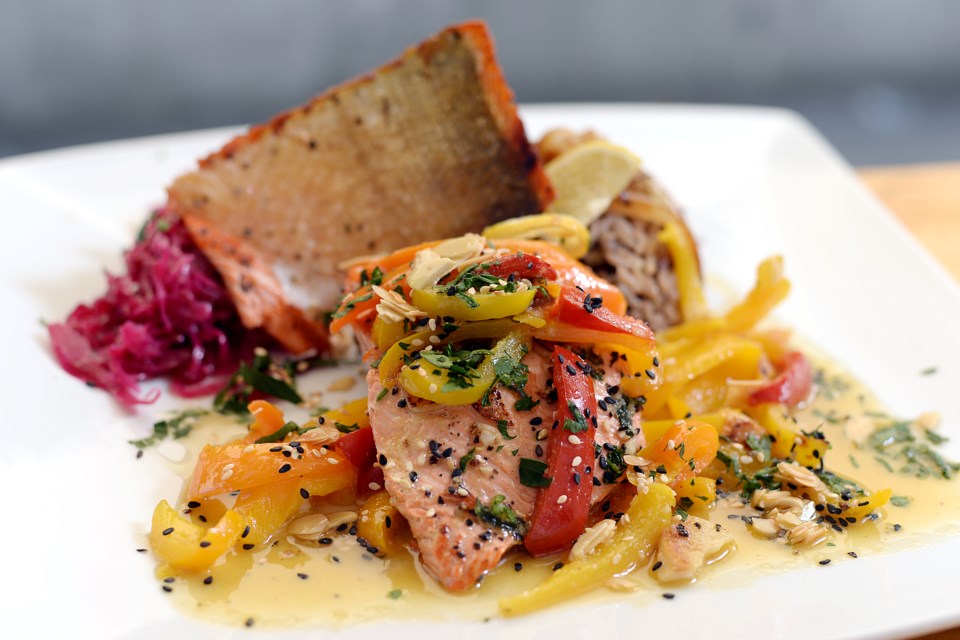A bite of Tamamâs slow roast chicken rubbed with earthy sumac spices and ancient green wheat simmered in olive oil mimics a journey through the narrow cobblestone streets of Old City Jerusalem and sun-drenched Palestine.
With a bright yellow sign radiating Mediterranean warmth, Tamam: Palestinian Fine Cuisine located on 2616 East Hasting St. is a rarity in the culinary world. Since opening last year, itâs likely the only Palestinian restaurant in Canada.
Owned and operated by a Palestinian-born husband and wife team, Sobhi Al-Zobaidi manages the restaurant while Tamam, a self-taught cook influenced by her father, cultivates traditional dishes in the open kitchen that leave customers on Yelp wondering how a smoky roasted eggplant dish, mutabal, could be so unexpectedly âcomplex.âÂ
âI remember every dish I ate ⦠Palestinian food is really sort of distinct,â says Sobhi. âI remember my grandmotherâs breakfast for example, frying goat cheese ⦠and making us a special bread that we dip in olive oil and zaâatar. And she fried goat cheese.â
For Sobhi and Tamam, itâs impossible to pin the distinct flavours of Palestine largely due to its many geographical zones. âYou can experience the coast, you can experience the mountains, you have the desert, and you have Jericho â itâs 300 metres below sea level, the lowest point in the world,â Sobhi insists. âSo these topographical changes in Palestine reflect on the food culture in that product.â
Yet Tamamâs roots in Jerusalem mean, for instance, that she serves a plate of warm hummus with extra garlic and lemon blended smoothly â unlike versions in other Middle Eastern countries.
However, Sobhi says there isnât one Palestinian falafel or hummus. From Jerusalem to Ramallah, every place takes pride in its way of making a dish. What Palestinians share, however, is preference for vegetable-abundant dishes such as veggie stews and stuffed grape leaves, carrots and cabbage rolls. The Palestinian meat staple is lamb, a popular item in the restaurantâs menu served with a side of lentils, rice and roasted onions.
Customers have noted online the restaurantâs âunpretentiousâ atmosphere with café-style chairs and tables, art installations by Sobhi and their five-year-old daughter, and an adjoining sun room stenciled with an olive tree mural in clay red and forest green.
East Â鶹´«Ã½Ó³»is a long way from the Jalazone refugee camp where Sobhi grew up and Tamamâs childhood in the streets of the Old City lined with meat and spice markets. Their paths crossed when Sobhi was scouting for an actor for one of his film projects as a New York University-trained director.
When asked how these two seemingly unrelated fields collide, Sobhi says the process of conceiving a dish and preparing it is âexactly similar to sitting and conceptualizing a film and try to write it ⦠and you see how people react to it.â
When asked why there are so few, if any, Palestinian restaurants around, Sobhi says many Palestinians work in the food industry but Sobhi believes they think naming it Palestinian will be unattractive and controversial given the political situation with Israel.
With ongoing conflicts between Israel and Palestine, the restaurant sparingly comments on the subject publicly. However, the community has reached out to them.
âMany of our Jewish friends came to the restaurant during the last few weeks just to express remorse, and just to show their support, their dissatisfaction, or theyâre against the war,â says Sobhi.
Tamam was distressed over the situation.
âAll of us we have kids, all of us we have moms, dads, and families and I feel everybody in the world have the right to live free. And we have even the minimum things in life, water, electricity, schools to study, books, and people in Gaza donât have ⦠minimum way to survive.â
twitter.com/JennyPengNow



